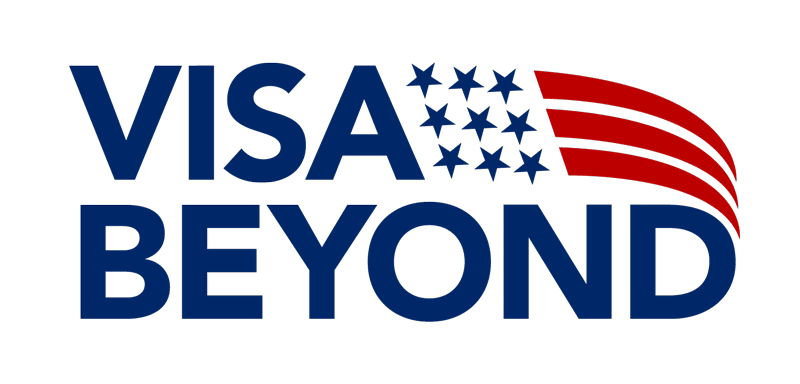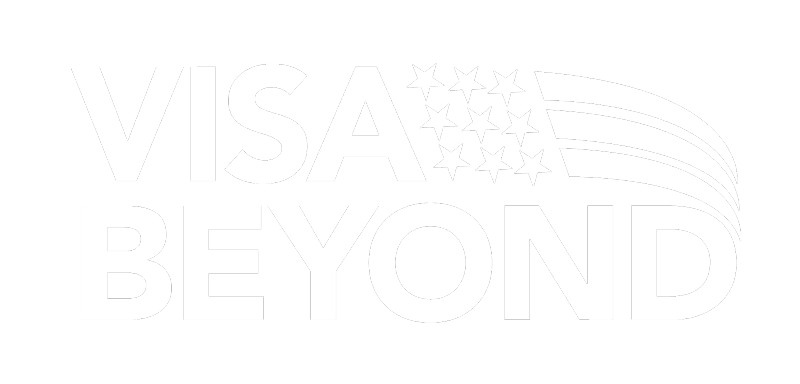Navigating the H-1B visa process can be daunting. Each year, thousands of applicants compete for a limited number of visas, and even the smallest mistake can lead to delays or denials. To help you increase your chances of success, we’ve identified the top five common mistakes applicants make during the H-1B visa application process and how to avoid them.
Overview of the H-1B Visa Application Process
What is the H-1B Visa?
The H-1B visa is a nonimmigrant work visa that allows U.S. companies to hire foreign workers in specialty occupations. These jobs typically require a bachelor’s degree or higher in a specialized field such as IT, engineering, healthcare, finance, or education.
Benefits of the H-1B Visa for International Professionals
The H-1B visa is highly sought after because it offers foreign workers the opportunity to gain valuable experience in the U.S. It also serves as a potential pathway to permanent residency (Green Card).
Key Requirements for H-1B Visa Approval
To qualify for an H-1B visa, the applicant must have a job offer from a U.S. employer, meet educational requirements, and the job must require specialized knowledge. The employer must also file a labor condition application (LCA) with the Department of Labor.
Timeline for the H-1B Visa Application: Key Dates to Remember
The H-1B process operates on a strict timeline. The application period usually begins in early April, and the visas become available at the start of the U.S. fiscal year in October. Due to high demand, it’s critical to prepare and file early to improve your chances in the H-1B lottery.
Mistake #1: Incomplete or Inaccurate Documentation
Common Errors in Filling Out the Form I-129 (Petition for a Nonimmigrant Worker)
Filing an incomplete or inaccurate Form I-129 is one of the most common reasons for H-1B visa denials. Applicants often forget to double-check critical information, such as job titles, company details, and supporting documentation.
How to Ensure You Submit Complete Supporting Documents
Gathering all required documents is key to a successful application. These include proof of educational qualifications, an employment offer letter, and supporting evidence of your job’s specialized nature. Review the USCIS guidelines for a full list of necessary documents.
Examples of Missing Documentation that Can Delay Approval
Missing or incorrect documents like educational degrees, employment verification letters, or the labor condition application can result in processing delays or denials. Always verify that each document is up to date and correctly formatted.
Can I Correct Mistakes on My H-1B Petition After Submission?
Yes, but the process can be time-consuming. If the USCIS issues a Request for Evidence (RFE), you’ll need to respond with the required documentation, which can cause delays. It’s best to get everything right the first time.
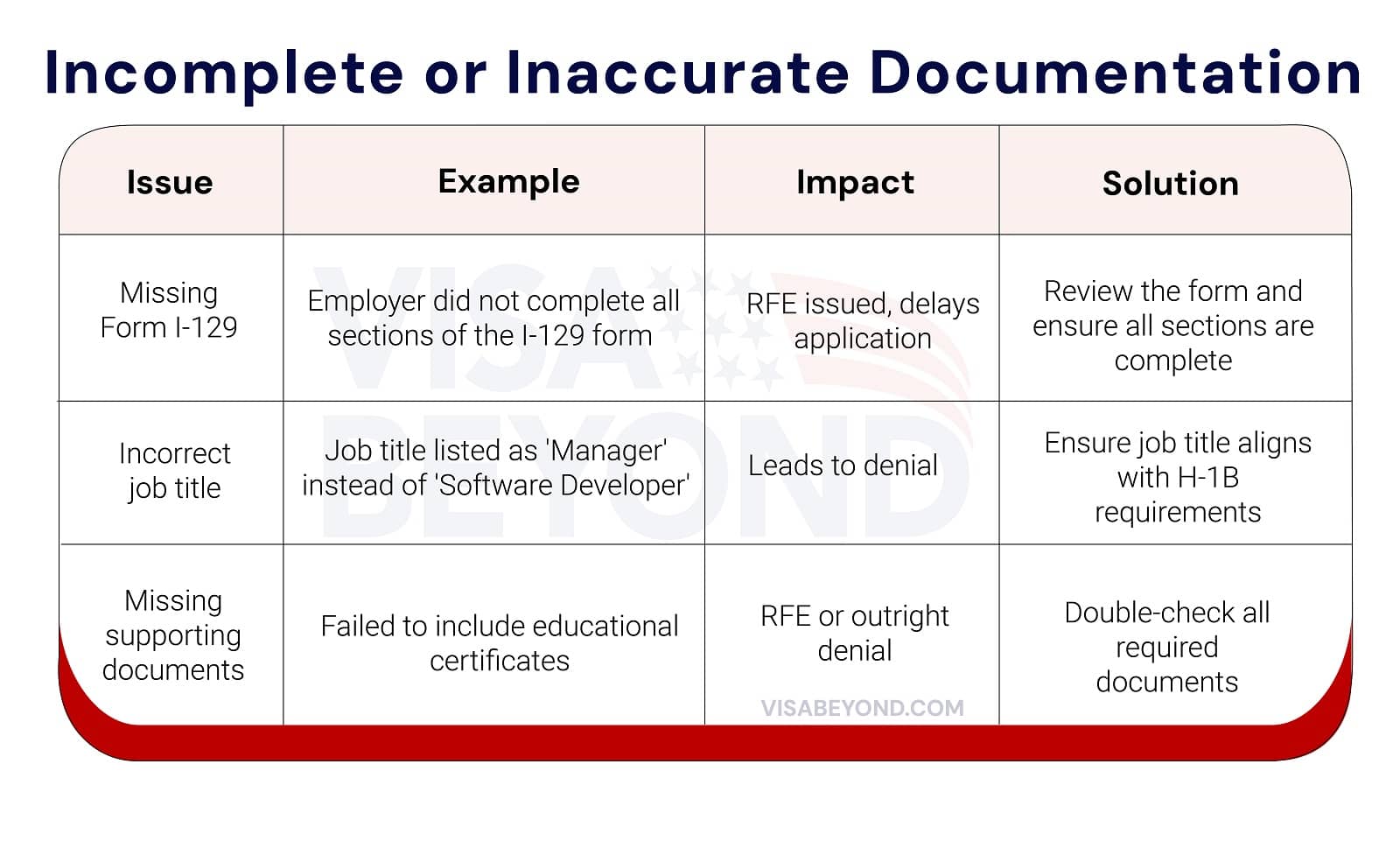
Mistake #2: Misunderstanding the H-1B Cap and Lottery Process
What is the H-1B Cap, and How Does It Affect Your Application?
Each fiscal year, the USCIS caps the number of new H-1B visas at 85,000—65,000 for those with bachelor’s degrees and 20,000 for individuals with advanced degrees from U.S. universities. Applications are selected through a random lottery if the number of applications exceeds the cap.
H-1B Lottery Tips: How to Maximize Your Chances
The H-1B lottery is random, but applying early and ensuring your application is flawless can help avoid automatic disqualification. Employers should be prepared to file as soon as the application window opens.
Exemptions from the H-1B Cap: Who Qualifies and How to Apply
Certain employers and applicants may be exempt from the H-1B cap. Nonprofit research institutions, universities, and government research organizations often fall under cap-exempt categories. If you work for these organizations, you may apply at any time during the year.
How Do I Know If My Application is Selected in the H-1B Lottery?
If your petition is selected, the USCIS will notify your employer. If not, your employer will receive the petition back along with any filing fees.
Real Experiences from Reddit: What Happens If You Don’t Get Selected?
Many applicants share their experiences of not being selected on forums like Reddit. Some reapply the following year, while others explore alternative visa options like the L-1 or O-1 visa, depending on their circumstances.
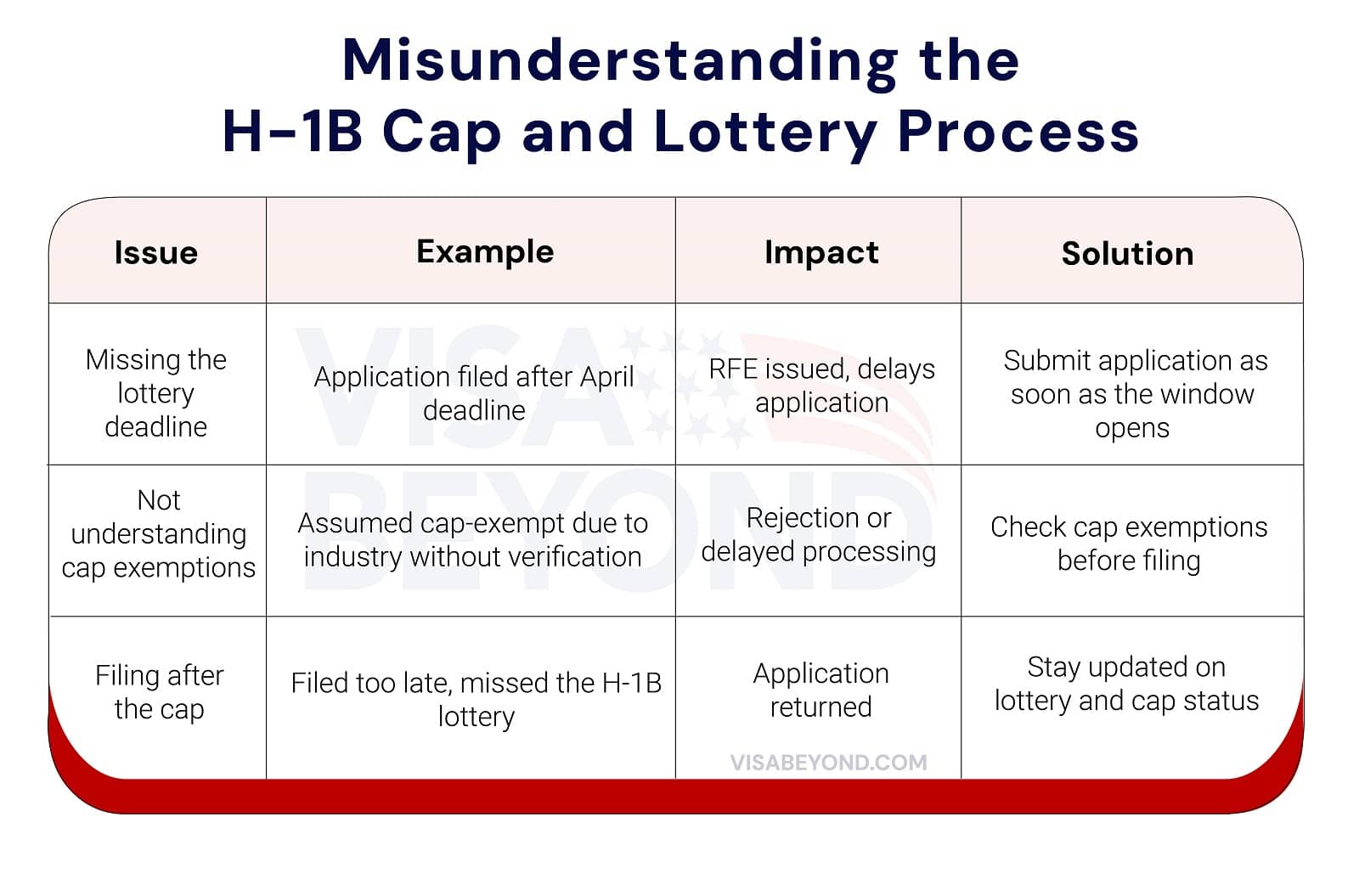
Mistake #3: Filing Without a Valid Job Offer or Improper Job Title
Why a Genuine Job Offer Is Crucial for H-1B Approval
One of the core requirements for an H-1B visa is a valid job offer from a U.S. employer. This job must be in a “specialty occupation” requiring a degree in a specific field.
What Job Titles Qualify for the H-1B Visa?
Certain job titles are more likely to qualify, such as software developers, data analysts, engineers, and scientists. However, vague or overly generic job titles like “manager” or “consultant” are often flagged for review.
Common Job Titles Rejected for H-1B and How to Avoid Them
Job titles that don’t clearly indicate specialized knowledge or a bachelor’s degree requirement often face scrutiny. Make sure your title and job description accurately reflect the role’s qualifications.
Job Offer Documentation: What Should Be Included?
Your offer letter must detail your salary, job description, and the employer’s expectations. This should also align with the prevailing wage in the area where you will work.
Case Study: How Incorrect Job Titles Have Led to Visa Denials
A Reddit user once shared their experience of having their H-1B petition denied due to an overly generic job title (“Analyst”) that didn’t match the specialized nature of their work. Using precise job titles like “Business Data Analyst” can make a big difference.
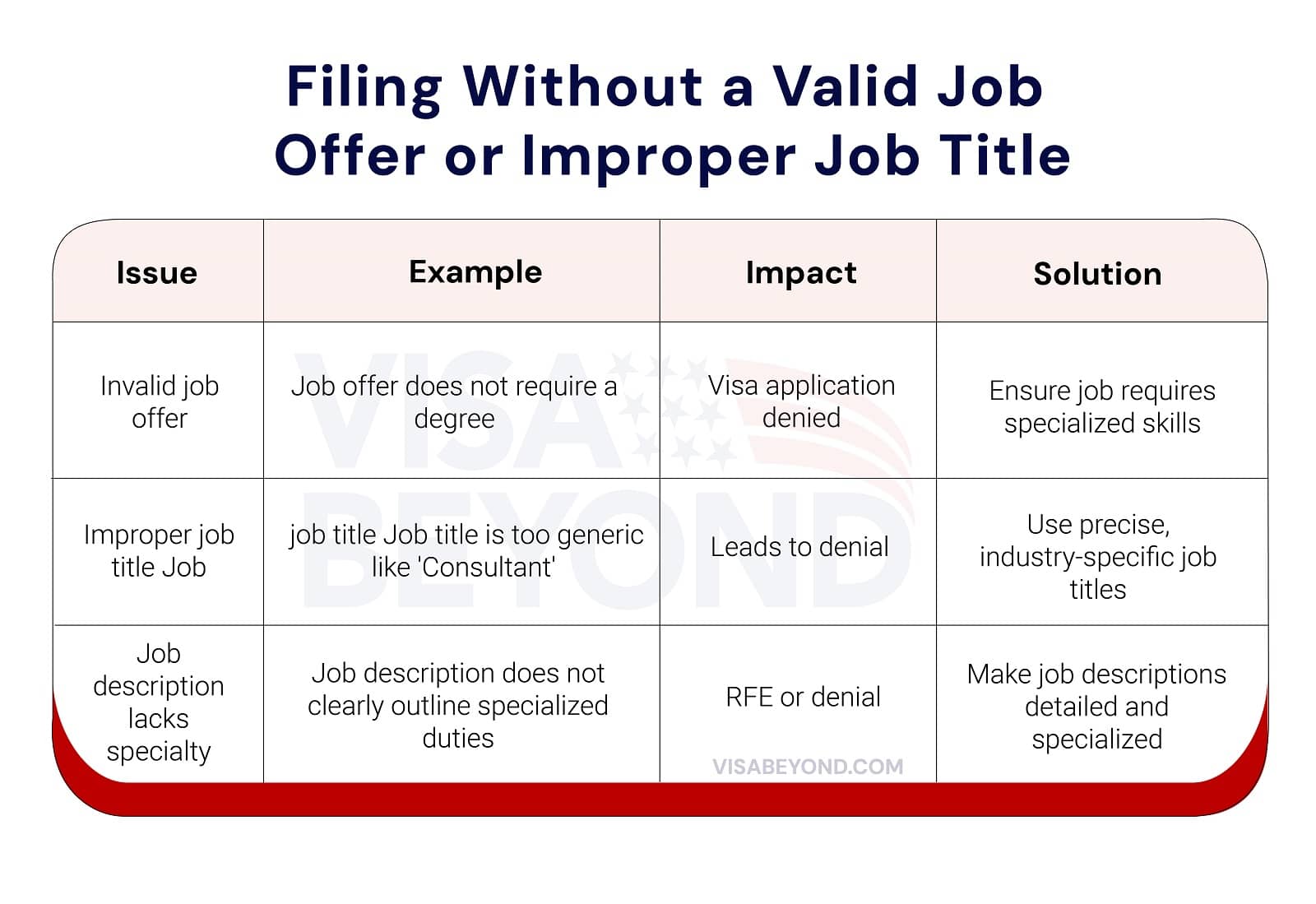
Mistake #4: Ignoring Prevailing Wage Requirements
What is the Prevailing Wage for H-1B Visa Jobs?
The prevailing wage is the average wage paid to similarly employed workers in a specific occupation in the geographic area where you will be working. It’s designed to protect U.S. workers and ensure that H-1B employees are paid fairly.
How to Ensure Your Job Offer Meets or Exceeds the Prevailing Wage
Before filing, ensure that your salary offer meets or exceeds the Department of Labor’s prevailing wage requirements for your job and location. You can check the wage levels on the Department of Labor’s website.
Consequences of Not Meeting the Prevailing Wage Criteria
If your salary does not meet the prevailing wage, your H-1B petition will likely be denied. In some cases, the USCIS may issue an RFE asking for proof of compliance.
How to Check the Prevailing Wage in Your Industry and Location
Use the Department of Labor’s Foreign Labor Certification Data Center to find the prevailing wage for your job and location. It’s essential to use the right occupation code (SOC) when checking this information.
What Happens If Your Employer Offers Less Than the Prevailing Wage?
According to a Quora user, offering less than the prevailing wage can lead to visa denial or even future legal action. Employers must ensure compliance with wage laws to protect both themselves and their employees.
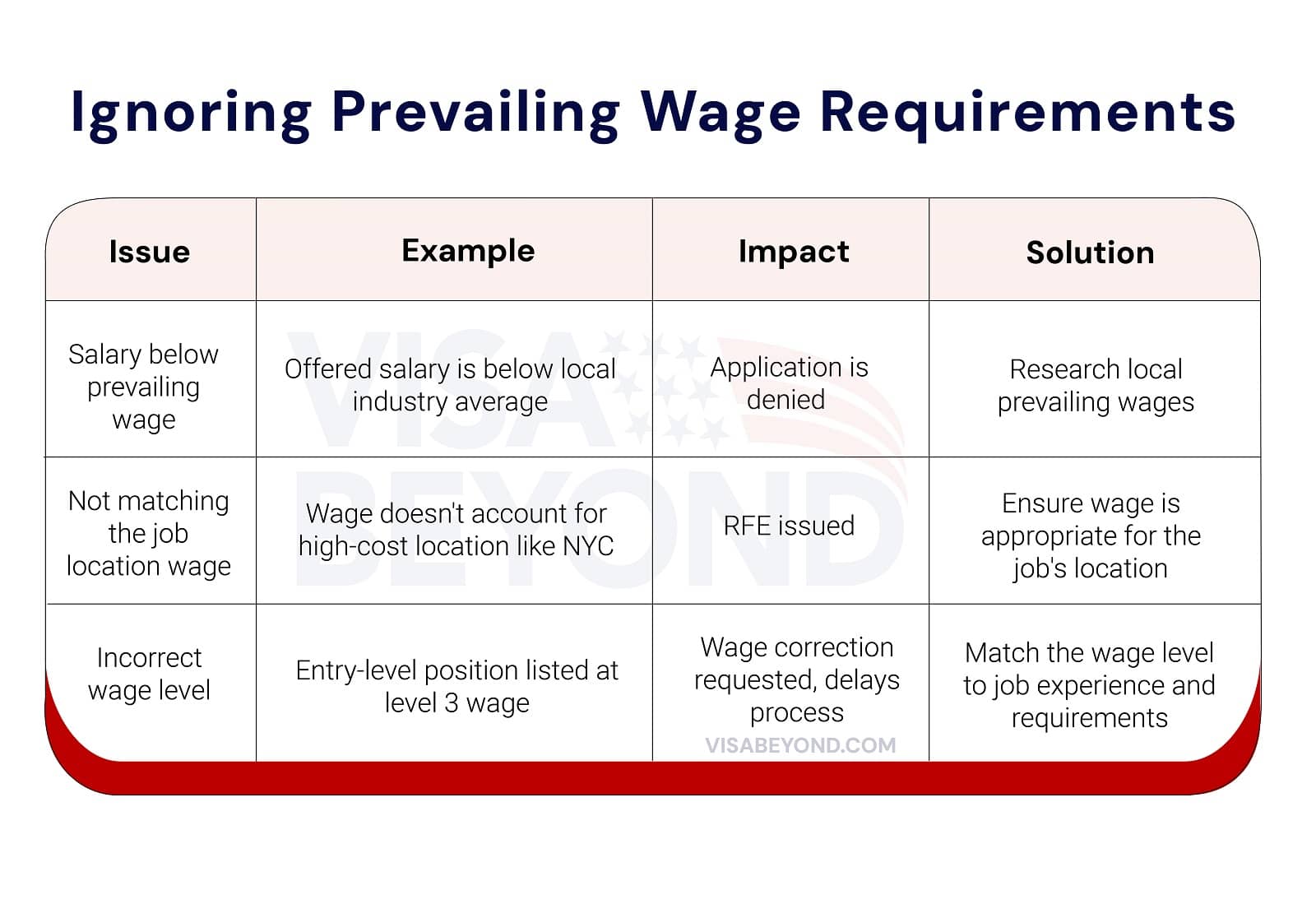
Mistake #5: Not Maintaining Visa Status After Approval
Key Rules to Follow After Your H-1B Visa is Approved
Maintaining your H-1B visa status is crucial to avoid deportation or penalties. You must continue working for your sponsoring employer and notify USCIS of any changes to your employment status.
Traveling Abroad on H-1B: What You Need to Know to Avoid Losing Status
Traveling outside the U.S. while on an H-1B visa requires proper documentation, such as an approved I-129 petition and a valid visa stamp. Ensure you have everything in order before leaving the country.
Can I Work for Multiple Employers on an H-1B Visa?
You can work for multiple employers, but each employer must file a separate H-1B petition for you. Unauthorized work outside of your sponsoring employer can result in loss of status.
How to Transfer or Extend Your H-1B Visa Without Losing Status
If you change employers, your new employer must file an H-1B transfer petition. You can start working for your new employer as soon as USCIS receives the petition, even before approval.
Common Mistakes When Changing Employers and Their Impact on H-1B Status
One common mistake is failing to file the transfer petition before starting work at the new company. Ensure you stay within legal guidelines to maintain your visa status.
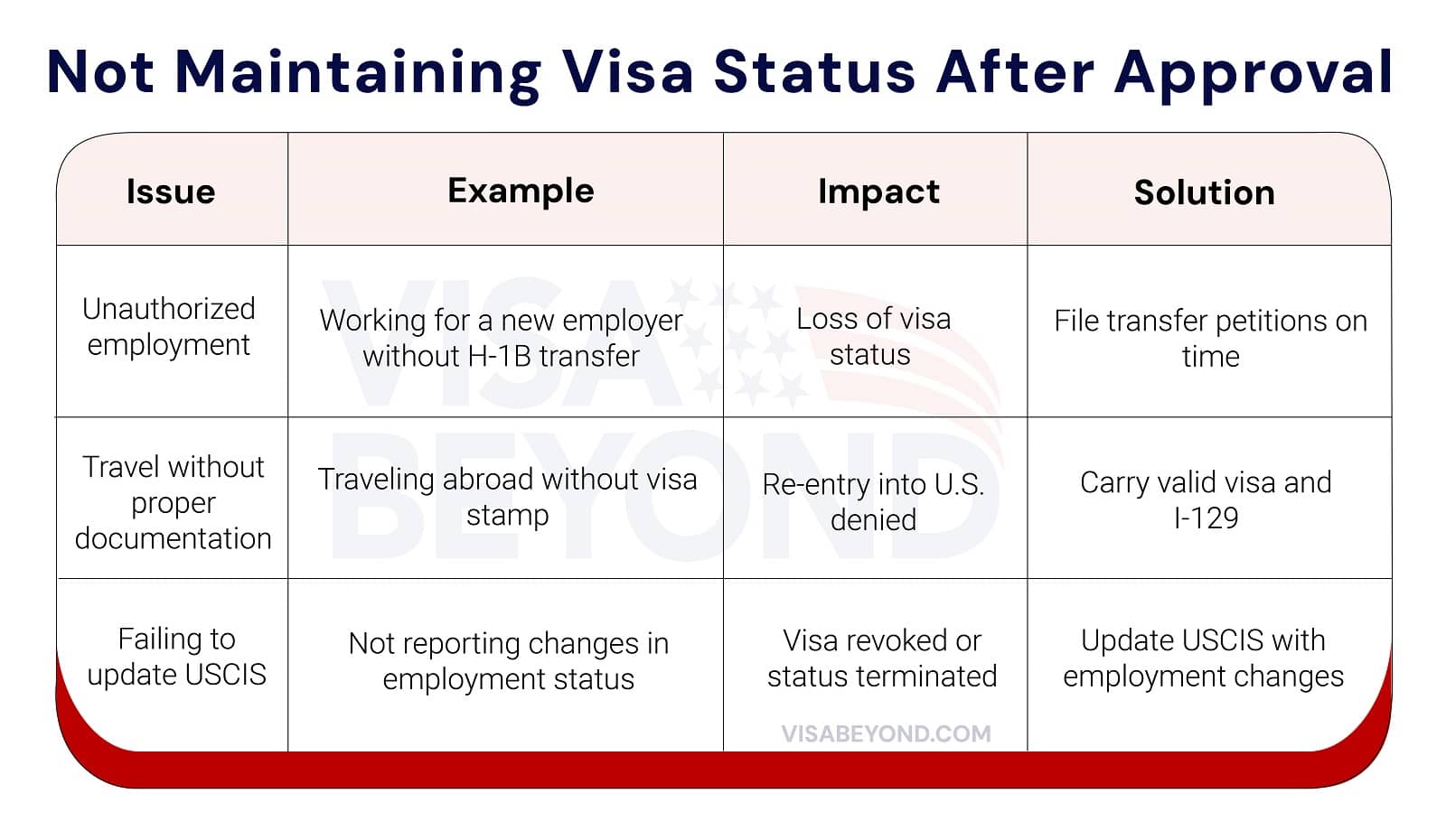
Final Tips for a Successful H-1B Visa Application
Applying for an H-1B visa can be challenging, but with proper preparation and guidance, you can significantly improve your chances of success. Here are a few essential tips to help you navigate the process smoothly.
Common Myths About the H-1B Visa Process (And What’s Actually True)
There are several misconceptions about the H-1B visa process that often confuse applicants. Here’s a list of common myths, debunked:
- Myth: “You can apply for an H-1B visa without a job offer.”
- Truth: You must have a valid job offer from a U.S. employer to qualify for the H-1B visa.
- Myth: “Only tech workers can apply for the H-1B visa.”
- Truth: The H-1B visa is available for specialty occupations in a wide range of fields, including healthcare, finance, education, and engineering.
- Myth: “The H-1B lottery is purely random, and there’s nothing you can do to improve your chances.”
- Truth: While the lottery is random, having an error-free application and applying early can prevent disqualification.
- Myth: “The H-1B is only for large companies.”
- Truth: Both small businesses and large corporations can sponsor H-1B visas. What matters is that the employer can prove they can meet prevailing wage requirements and the job is in a specialty occupation.
- Myth: “If your H-1B visa is denied, you can’t reapply.”
- Truth: You can reapply the next year or explore alternative visa options such as the O-1 visa for individuals with extraordinary abilities.
Real Success Stories: How Applicants Overcame Visa Challenges
Many applicants face challenges during the H-1B process, but persistence and preparation often lead to success. Here are a few real-world stories:
- Story #1: Overcoming an RFE
Sarah, an IT professional, received an RFE after her initial H-1B submission due to insufficient documentation about her job’s specialty requirements. She worked with an immigration lawyer, who helped her gather the necessary proof and resubmit her application. Three months later, her visa was approved. - Story #2: Navigating the H-1B Cap
Raj, an engineer, was not selected in the H-1B lottery in his first attempt. However, he didn’t give up and reapplied the following year, ensuring all documents were accurate and that his employer met all wage requirements. This time, his application was selected, and he successfully obtained his H-1B visa. - Story #3: Changing Employers on H-1B
Maria, a marketing specialist, wanted to switch employers during her H-1B status. She was unsure of the process and consulted an immigration attorney who guided her on filing an H-1B transfer petition. The new petition was approved, and she was able to seamlessly transition to her new job without losing her H-1B status. - Story #4: Securing Cap-Exempt H-1B Status
A nonprofit research institution sponsored Carlos, a data scientist, who qualified for the cap-exempt H-1B visa. His employer worked closely with an immigration attorney to ensure all forms were submitted on time, avoiding the lottery process entirely.
Conclusion
Applying for an H-1B visa can be a complex and competitive process, but understanding common pitfalls, debunking myths, and seeking professional guidance will increase your chances of success. Remember, each step of the process requires attention to detail, and with the right support, you can avoid costly mistakes and secure your H-1B visa.
